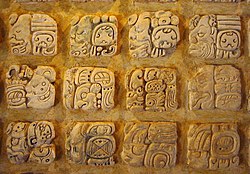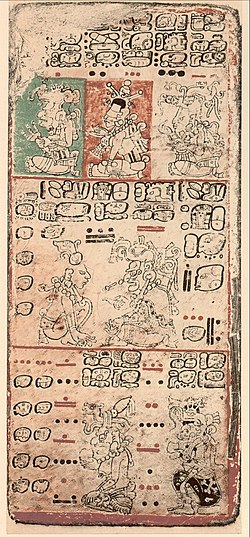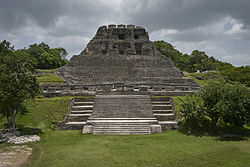Classic Maya (or properly Classical Chʼoltiʼ) is the oldest historically attested member of the Mayan language family. It is the main language documented...
23 KB (2,434 words) - 00:29, 13 February 2025
time, and both are commonly referred to as "Classic Maya language". Although a single prestige language was by far the most frequently recorded on extant...
95 KB (9,353 words) - 15:38, 22 May 2025
era to form over 30 languages that have survived into modern times. The language of almost all Classic Maya texts over the entire Maya area has been identified...
187 KB (22,908 words) - 01:13, 26 April 2025
most names are either Yucatec or Kʼicheʼ. The Classic Period names (belonging to the Classic Maya language) are only rarely known with certainty. Alphabetical...
15 KB (1,776 words) - 11:06, 28 March 2025
Classic Maya art, is mentioned in Classic period glyph texts and has been verified archaeologically by analysis of skeletal remains from the Classic and...
41 KB (5,070 words) - 14:05, 13 May 2025
common ancestor of the 30 living Mayan languages, as well as the Classic Maya language documented in the Maya inscriptions. While there has been some...
14 KB (831 words) - 01:16, 20 May 2025
In archaeology, the classic Maya collapse was the destabilization of Classic Maya civilization and the violent collapse and abandonment of many southern...
42 KB (5,081 words) - 21:32, 28 April 2025
Chʼortiʼ is a direct descendant of the Classic Maya language in which many of the pre-Columbian inscriptions using the Maya script were written. Chʼortiʼ is...
23 KB (1,916 words) - 21:02, 3 May 2025
other classic texts were written by scribes—usually members of the Maya priesthood—in Classic Maya, a literary form of the extinct Chʼoltiʼ language. It...
60 KB (5,828 words) - 07:10, 16 April 2025
the oldest Maya myth to have been preserved in its entirety. Called Hunahpu [hunaxˈpu] and Xbalanque [ʃɓalaŋˈke] in the Kʼicheʼ language, the Twins have...
32 KB (4,593 words) - 20:57, 4 May 2025
distinct life, often speaking one of the Mayan languages as a primary language. One of the largest groups of Maya live in the Yucatan Peninsula, which includes...
45 KB (5,123 words) - 23:49, 22 May 2025
languages that best reflect their relationship with the Classic Maya language. Ch'ol-language programming is carried by the CDI's radio station XEXPUJ-AM...
26 KB (2,335 words) - 20:02, 10 February 2025
Aztec calendars. By the Maya mythological tradition, as documented in Colonial Yucatec accounts and reconstructed from Late Classic and Postclassic inscriptions...
42 KB (4,765 words) - 17:12, 20 March 2025
monuments are found throughout the Maya region. The sculpting of these monuments spread throughout the Maya area during the Classic Period (250-900 AD), and these...
314 KB (11,286 words) - 14:55, 24 March 2025
Preclassic period in Maya history stretches from the beginning of permanent village life c. 1000 BC until the advent of the Classic Period c. 250 AD, and...
12 KB (1,408 words) - 21:56, 29 March 2025
in an ancestral form of one or more of the Ch’olan languages. Chʼortiʼ language Classic Maya language Becquey 2012, para. 13 notes that some Spanish colonial...
10 KB (784 words) - 17:31, 16 February 2025
seven centuries of the Classic Period (c. 250 to 950 CE). Maya art forms tend to be more stiffly organized during the Early Classic (250-550 CE) and to become...
52 KB (7,017 words) - 12:26, 3 May 2025
Mesoamerican chronology (redirect from Maya Classic Period)
those found in Mexico. 250–900 CE The Classic Period was dominated by numerous independent city-states in the Maya region and also featured the beginnings...
74 KB (8,868 words) - 22:15, 20 April 2025
Maya mythology or Mayan mythology is part of Mesoamerican mythology and comprises all of the Maya tales in which personified forces of nature, deities...
23 KB (3,418 words) - 17:25, 8 May 2025
Maya codices (sg.: codex) are folding books written by the pre-Columbian Maya civilization in Maya hieroglyphic script on Mesoamerican bark paper. The...
31 KB (3,633 words) - 16:14, 4 May 2025
Calakmul (redirect from Kaan (Maya state))
by the Maya. During the Preclassic and Classic periods settlement was concentrated along the edge of the El Laberinto bajo, during the Classic period...
71 KB (9,240 words) - 23:46, 23 April 2025
Chichen Itza (category Maya sites that survived the end of the Classic Period)
traditional Yucatec Maya) Yucatec Maya pronunciation was a large pre-Columbian city built by the Maya people of the Terminal Classic period. The archeological...
86 KB (10,293 words) - 18:25, 22 March 2025
phenomena by the Precolumbian Maya civilization of Mesoamerica. The Classic Maya in particular developed some of the most accurate pre-telescope astronomy...
50 KB (7,072 words) - 01:04, 18 February 2025
Mayan cities (redirect from Cities of the Maya)
to develop into the capital cities of early Maya states. The political relationship between Classic Maya city-states has been likened to the relationships...
30 KB (2,879 words) - 15:03, 21 May 2025
The history of Maya civilization is divided into three principal periods: the Preclassic, Classic and Postclassic periods; these were preceded by the Archaic...
60 KB (7,260 words) - 23:21, 28 February 2025
Spanish 16th-century texts and is depicted in the art of the Classic Period (200–900 AD). The Maya played instruments such as trumpets, flutes, whistles, and...
15 KB (2,229 words) - 06:25, 1 March 2025
Orange Walk in Belize. The vast majority of them speak the Yucatec Maya language, or maayat'aan (autoglottonym). The preclassical period spanned from...
4 KB (373 words) - 12:53, 16 May 2025
Kʼicheʼ people (redirect from K'iche' Maya)
Americas and are one of the Maya peoples. The eponymous Kʼicheʼ language is a Mesoamerican language in the Mayan language family. The highland Kʼicheʼ...
27 KB (2,710 words) - 18:31, 4 April 2025
been built and populated by speakers of Maya languages, and others by speakers of other Mesoamerican languages, including Xinca, Lenca, Mixe–Zoquean, and...
27 KB (3,949 words) - 23:04, 6 October 2024
Xunantunich (category Maya sites that survived the end of the Classic Period)
(1 km) to the west. It served as a Maya civic ceremonial centre to the Belize Valley region in the Late and Terminal Classic periods (c.700-900AD). At that...
17 KB (2,080 words) - 00:05, 12 May 2025

















